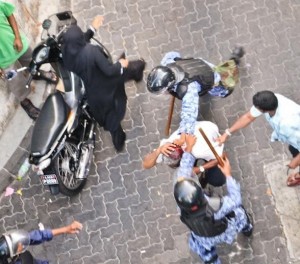MPs yesterday debated legislation on health professionals submitted by the government to create oversight councils seeking to maintain standards, ensure qualifications, investigate complaints, and take disciplinary measures.
Presenting the bill (Dhivehi) on behalf of the government, Progressive Party of Maldives (PPM) MP Ahmed Shiyam explained that “the bill very clearly defines health professionals, medical practitioners, dental practitioners, nurses and midwives.”
The bill proposes the creation of “a medical and dental council, nursing and midwifery council, and the allied health council,” he said.
The MP for Lhaviyani Naifaru added that the bill also specifies the responsibilities and tasks of the councils as well as criteria and procedures for appointing members.
Shiyam said the bill was “long overdue” and contended that the absence of such legislation was the “main reason” for the deterioration of the health sector.
In the ensuing debate, opposition Maldivian Democratic Party (MDP) MP Rozaina Adam agreed that the bill was overdue but suggested that shortcomings needed to be addressed at the committee stage.
An insurance mechanism for doctors was not included in the bill, she said, noting that the practice in other countries was for compensation for medical negligence to be paid out of an insurance scheme.
“It is not possible for doctors to pay for that out of their own pockets,” she said, adding that she hoped provisions would be added to provide “liability insurance” for doctors.
Rozaina also accused the government of plotting to remove former Health Minister Dr Mariyam Shakeela by modifying her initial portfolio on July 1 and transferring the gender department to the new Ministry of Law and Gender to be headed by Attorney General Mohamed Anil.
Shakeela was reappointed as Minister of Health and nominated for parliamentary approval. Shakeela was dismissed yesterday after she failed to secure parliamentary consent when pro-government MPs voted against confirming her appointment on Monday (August 11).
Rozaina argued that it was unconstitutional for the attorney general to head a ministry as his mandate was clearly defined.
If the ruling party’s MPs did not have confidence in Shakeela, Rozaina said President Abdulla Yameen could have not reappointed her instead of subjecting her to “public humiliation”.
While pro-government MPs spoke in favour of the health professionals bill, other MDP MPs contended that the health sector would not be improved by passing the bill.
MP Abdul Ghafoor Moosa suggested that the number of employees in the health sector was excessive and redundant and questioned the “competency” of the government to improve the quality of healthcare.
Adhaalath Party MP Anara Naeem meanwhile said all Maldivian citizens agreed that the health sector was in dire need of improvements and stressed the importance of a law to ensure standards for health professionals.
“Outreach programmes of Israeli Zionists”
Introducing the legislation, MP Shiyam praised former President Maumoon Abdul Gayoom for the “positive revolution” brought to the health sector during the PPM leader’s “golden” 30-year reign.
However, the progress achieved under Gayoom “came to a halt when certain people destroyed the health sector in the name of democracy,” Shiyam claimed, and as a consequence of former President Mohamed Nasheed allegedly replacing health professionals with political appointees.
The health sector deteriorated “as a result of conducting outreach programmes of Israeli Zionists and efforts to instil a culture of spreading the Jewish religion in the name of healthcare,” he said, which was “tragic and dangerous”.
Shiyam was interrupted by MDP MP Ibrahim Shareef raising a point of order and objecting to pro-government MPs “turning the Majlis into a political podium” with rhetoric that was irrelevant to the bill up for debate.
After Speaker Abdulla Maseeh Mohamed dismissed the point of order, Shiyam said he was “highlighting the causes of the health sector being in the state it is in today”.
“I condemn efforts by the previous government to spread secularism by bringing Zionists here,” he said.
In November 2010, the Islamic Foundation of Maldives called on the government to “shun all medical aid from the Zionist regime” while a team of seven Israeli eye doctors was due to arrive the next month, claiming that Isreali doctors and surgeons “have become notorious for illegally harvesting organs from non-Jews around the world.”
However, despite protests and flag burning, the Disaster Management Centre revealed in December 2010 that in addition to screening of some 215 people in the capital, 16 patients underwent surgery with the Eye from Zion doctors, 104 received consultations, and 137 people were treated in Gaaf Dhaal Thinadhoo by the Israeli NGO.
